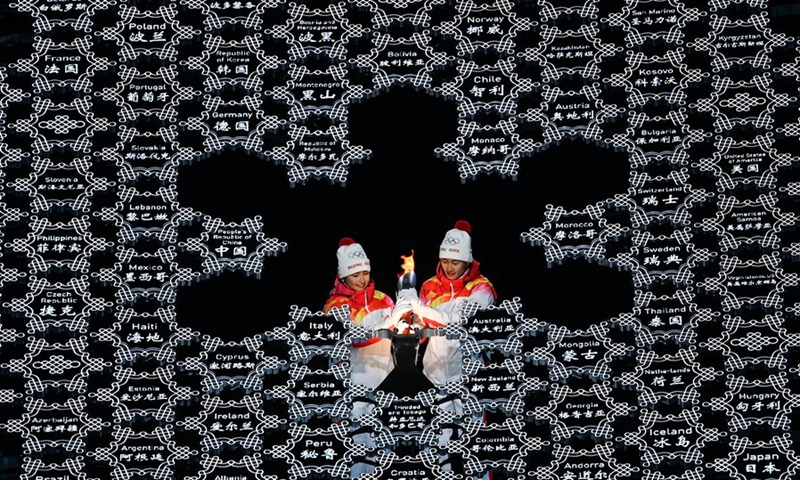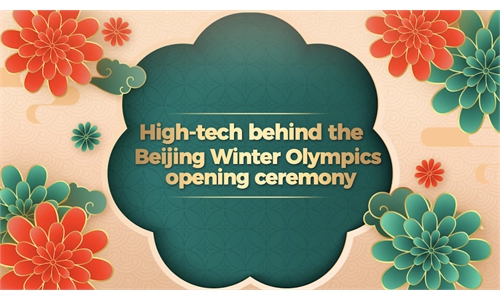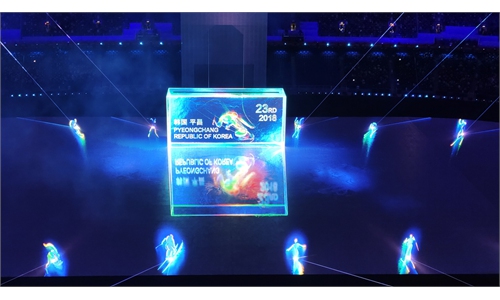
Torch bearers Dinigeer Yilamujiang (L) and Zhao Jiawen set the torch into the Olympic cauldron during the opening ceremony of the Beijing 2022 Olympic Winter Games.(Photo: Xinhua)
US magazine Rolling Stone claimed on Friday in an article that Olympians from several countries "privately boycotted" the opening ceremony of the Beijing 2022 Winter Olympic Games in protest of China's "human rights abuses," according to its so-called sources. The report then argued that "a low-key protest movement is bubbling up," led by Team USA.Whoever watched the opening ceremony of the Games might notice that not all athletes participated in the event. The athletes under quarantine, for instance, couldn't make it to the ceremony. No rule from the International Olympic Committee says that athletes have to attend the opening ceremony, so the absence of some Olympians, be it due to whatever reason, should not have been a big deal.
Even if some athletes did skip the event to echo the "diplomatic boycott" advocated by governments of some Western countries, it did not detract from the successful start of the Games. Through TV and social media, people all over the world can see most athletes enjoying their time in the Olympic village and carefully preparing for the matches.
Those who tried to undermine the Games are insignificant against this backdrop. It is even doubtful that there is a "secret protest movement," as Rolling Stone said. Based on the actual volume of those voices, it is not supported by the majority of athletes.
From the preparation to the actual beginning, the Beijing Winter Olympics have been accompanied by attempts of some in the West to attack China. This includes calls for a "diplomatic boycott," hype over food safety and network security at the Winter Olympics, and incitement for an "athlete boycott." However, these attempts have all failed. It seems that now it's the time for the so-called secret protest movement to enter the stage.
There is a global consensus that sports should not be politicized and that the Olympics is not a political event. Some forces in the US now are still making all efforts to turn the grand sports event into an opportunity to condemn Beijing. Hyping the so-called secret movement is a kind of joke on the US for its clownery, as the world will see how it destroys sportsmanship by insisting on politicizing the Olympics.
Under an endless media barrage - accusations of China's so-called human rights violations - in Western society, it is quite difficult for ordinary people in the West, including athletes, not to become a "victim" of distorted reports.
But athletes can always find the truths via first-hand observation. The development of the country's poverty alleviation, COVID-19 prevention and control, as well as infrastructure construction will show them what the reality is.
Li Haidong, a professor at the Institute of International Relations of the China Foreign Affairs University, believes that despite the efforts of some Western media to try to lure some athletes into this discourse trap against China, it is evident that most Olympians can tell right from wrong. According to Li, there is a "stark contrast" between what these athletes really see and feel in China and how some Western media portray the country.
"I believe that most athletes participating in the Games in Beijing will be able to make a more accurate judgment on China based on their own experiences. From the opening ceremony, to the life in Olympic village, to the huge development of China's sports and sportsmanship showed by Chinese athletes, all these will help them change their impression of China," Li said.
The author is a reporter with the Global Times. opinion@globaltimes.com.cn



